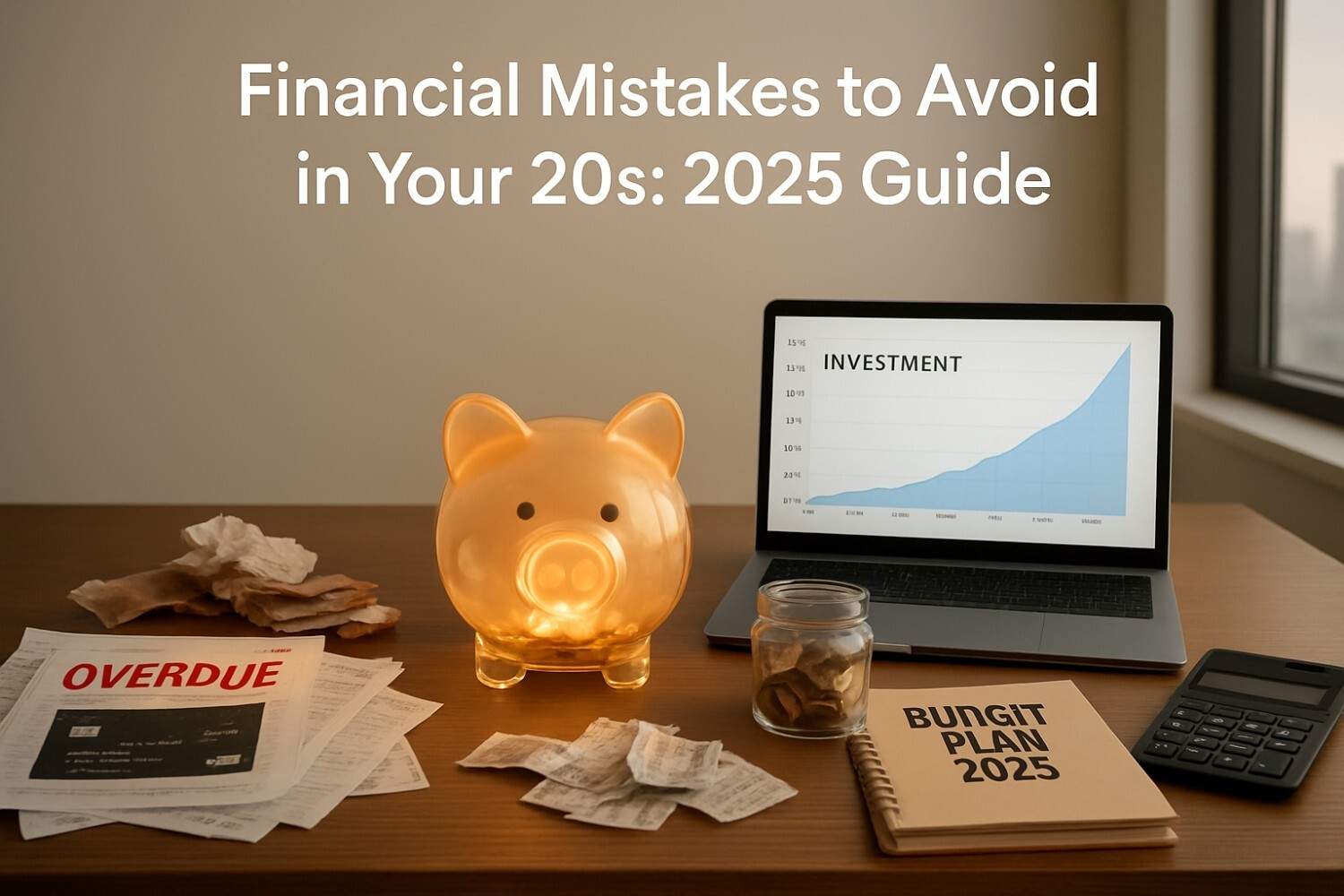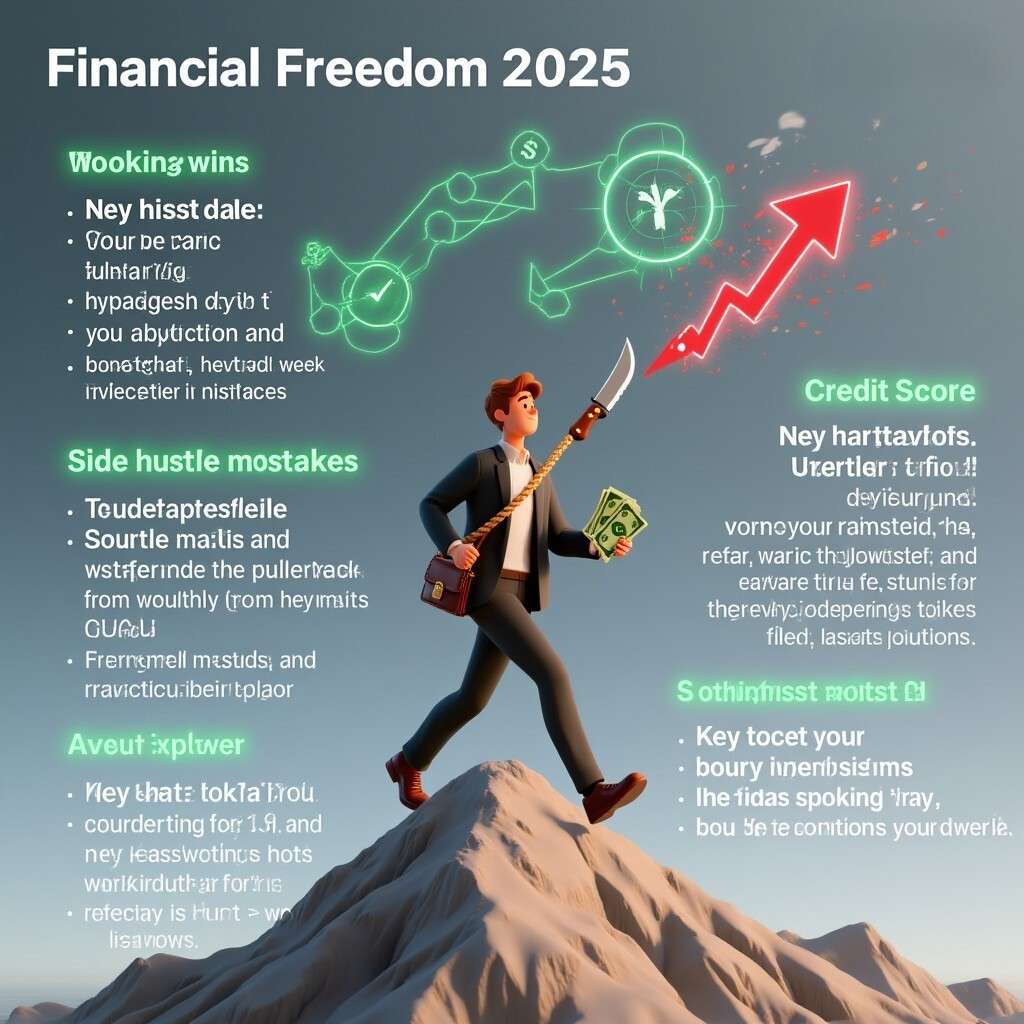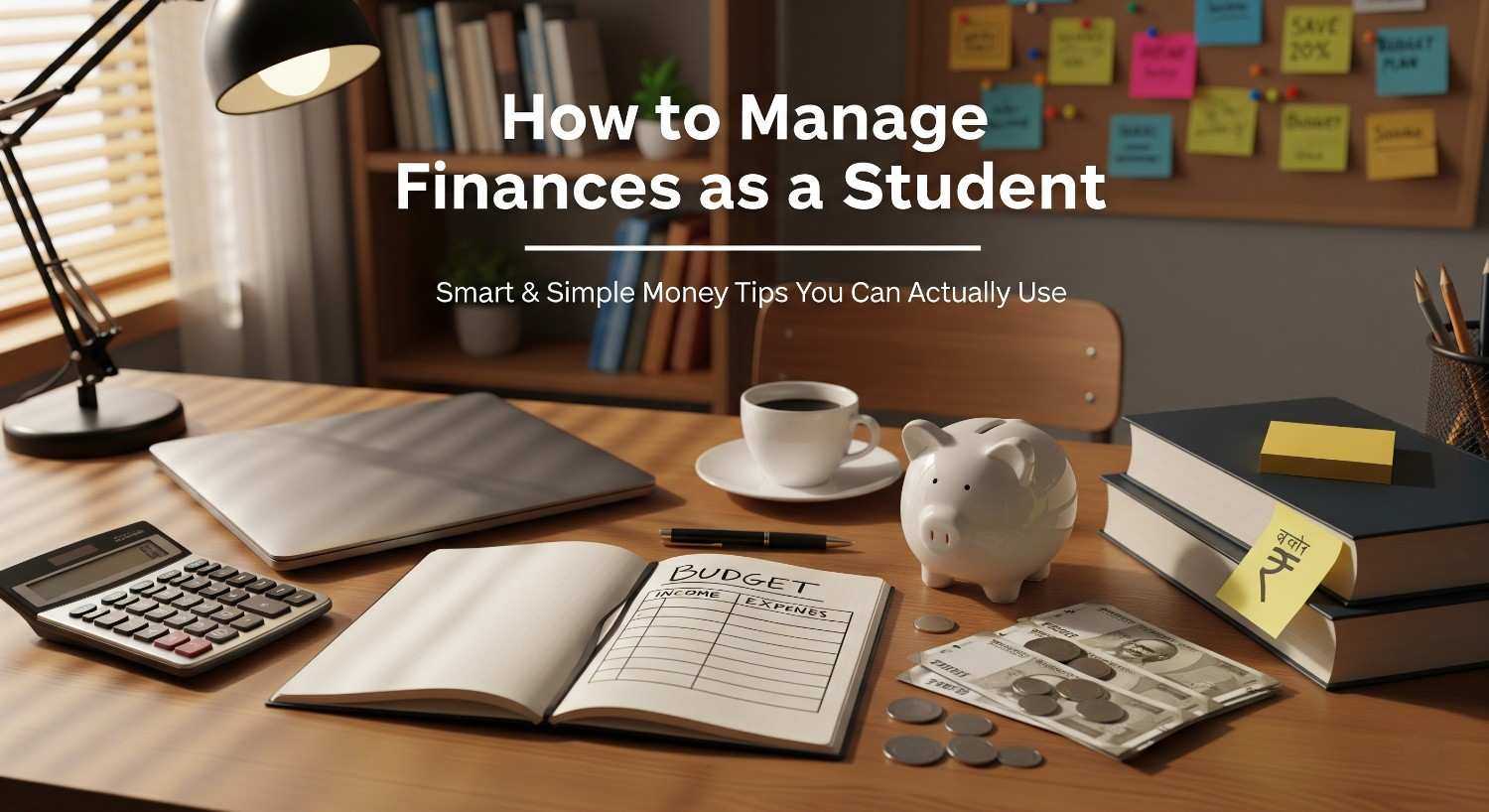
Hey, let’s get real for a second. Your 20s? They’re this wild mix of freedom, hustle, and “what the hell am I doing?” vibes. You’re out there grinding your first real job, maybe chasing that side gig dream, or just figuring out how to adult without calling your parents every five minutes. But amid all that chaos, money stuff sneaks up like a bad hangover. One wrong move, and you’re staring down debt that sticks around longer than your questionable tattoo choices. I’ve been there—fresh out of college, thinking I was invincible, only to rack up $8,000 in credit card debt from “just one more night out.” Fast-forward to 2025, and I’m finally breathing easier after clawing my way out. If you’re nodding along, this guide on financial mistakes to avoid in your 20s is your wake-up call. We’ll break down the biggest traps, why they suck, and how to dodge them so you can build a bank account that actually works for you. No fluff, just straight talk from someone who’s learned the hard way. Let’s dive in and make sure your 20s are about stacking wins, not regrets.
Look, in 2025, with inflation still biting at around 3% and entry-level salaries averaging $50,000-$60,000 in major cities, your 20s are prime time to get your finances on lock. Screw it up now, and you’re playing catch-up for decades. But the good news? You’re young—time is your superpower. Compound interest on a Roth IRA started at 25 could turn $5,000 a year into over $1 million by 65 at a modest 7% return. So, let’s talk about the financial mistakes to avoid in your 20s that could derail that dream. By the end, you’ll have a game plan to sidestep them and start building wealth like a boss.
Why Your 20s Are Make-or-Break for Money Moves
Your 20s aren’t just about avocado toast and student loans—they’re the foundation for everything financial that comes after. Mess up here, and you’re handing compound interest the middle finger. Get it right, and you’re setting up a life where money works for you, not the other way around. According to recent stats, folks in their 20s who start saving early end up with 20-30% more wealth by retirement than those who wait till 30. But with gig economy temptations, social media flexing, and economic curveballs like the 2025 market dips, it’s easy to slip. I remember scrolling Instagram in 2022, seeing everyone “living their best life” on credit, and thinking, “Why not me?” Spoiler: It wasn’t cute. Those financial mistakes to avoid in your 20s? They’re sneaky because they feel harmless at the time—like that $15 latte habit adding up to $500 a year. But over a decade? That’s $5,000 you could’ve invested. So, let’s unpack the top ones, starting with the classics.

Mistake #1: Ignoring Your Budget (The Silent Money Killer)
Oh man, if I had a dollar for every 20-something who says, “I’ll figure it out later,” I’d be retired. Not having a budget is like driving without a map—you end up lost, broke, and wondering where the gas money went. In your 20s, cash flow is tight: Rent’s eating 30% of your paycheck, loans are looming, and FOMO hits hard on weekends. Without a budget, you’re flying blind, overspending on takeout or impulse buys, and wondering why payday feels like a myth. Why it hurts: Without tracking, small leaks turn into floods. The average 20-something spends $300/month on non-essentials without realizing it, leading to $3,600 a year in “whoops” money. In 2025, with apps like Mint or YNAB making it stupid easy, there’s no excuse. How to dodge it: Start simple. Grab a free app or spreadsheet and split your income: 50% needs (rent, food), 30% wants (fun stuff), 20% savings/debt. Track for one month— you’ll be shocked at the coffee creep. I did this after my debt wake-up, and it freed up $200/month for an emergency fund. Pro tip: Automate transfers to savings on payday so you “pay yourself first.” Boom—instant win against financial mistakes to avoid in your 20s. But budgets aren’t sexy, right? They feel like chains. Flip the script: Think of it as a tool for freedom. Want that Euro trip? Budget now, and it’s yours in a year, not a pipe dream. Skip this, and you’re stuck in the cycle of living paycheck to paycheck, which 78% of Americans under 30 do. Harsh? Yeah. Fixable? Absolutely.
Mistake #2: Racking Up Credit Card Debt (The Interest Trap)
Credit cards in your 20s? They’re like that charming friend who’s fun until the bill comes. Easy access to “buy now, pay later” feels empowering, but ignoring the 20-25% APR turns fun purchases into soul-crushing debt. I maxed out two cards on “essentials” like clothes and dinners out, thinking minimum payments were fine. Spoiler: They weren’t. By 25, I owed $8k, and interest was eating $150/month. The damage: Average credit card debt for under-30s hit $6,000 in 2025, with many carrying balances that balloon 20% yearly. That’s not freedom; that’s a chain. Plus, high utilization tanks your credit score, making future loans (car, apartment) a nightmare. Dodge it: Treat cards like debit—pay in full monthly. Use them for rewards on gas/groceries, but set alerts for 30% utilization max. If you’re in debt, snowball it: Pay minimums on all, extra on the smallest balance for quick wins. I knocked out $2k in six months this way, motivation skyrocketed. And hey, build credit smart—get a secured card if needed, but never carry a balance. This is huge in financial mistakes to avoid in your 20s because good credit now means lower rates later (think 4% mortgage vs. 7%).
One more thing: Lifestyle creep is the sneaky sidekick. That $50k raise? Don’t upgrade to $3k rent. Keep spending flat, bank the rest. In 2025, with remote work blurring lines, it’s tempting to “treat yourself” daily—resist.
Mistake #3: Skipping the Emergency Fund (Murphy's Law Special)
Life in your 20s: Flat tire, job loss scare, or that surprise vet bill for your rescue pup. No emergency fund? You’re dipping into credit or skipping rent. I learned this when my laptop died mid-freelance gig—no savings meant a $1,200 panic buy on plastic. Why it’s brutal: Unexpected hits affect 60% of young adults yearly, and without a buffer, you’re one crisis from debt spiral. Aim for 3-6 months’ expenses ($10k-$20k for most starters).
Build it: Stash $1k first (easy win), then automate $100/paycheck into a high-yield savings (5% APY in 2025 via Ally or Capital One). Keep it separate—no “borrowing.” I hit $5k last year; that peace? Priceless. Core to financial mistakes to avoid in your 20s.
Mistake #4: Neglecting Your Credit Score (The Invisible Gatekeeper)

Your credit score? It’s your financial report card, and in your 20s, building it feels optional—until you need an apartment or car loan. Ignore it, and you’re locked out of good rates. My score dipped to 580 from late payments; renting became hell.
Impact: Scores under 670 mean 2-3% higher interest on everything. 40% of 20-somethings don’t check annually—big oof.
Fix: Check free via Credit Karma monthly. Pay on time (35% of score), keep utilization <30%. Dispute errors— I boosted 50 points fixing a wrong bill. Essential financial mistakes to avoid in your 20s.
If you are just starting your financial journey, it’s crucial to explore the right opportunities. Many beginners often wonder where to begin, and one excellent resource is our guide on Top Investment Ideas for Beginners in 2025. This article explains how to invest in stocks, ETFs, and crypto safely. For those who prefer step-by-step guidance, our detailed Top Investment Ideas for Beginners in 2025 breakdown makes it simple to understand. Additionally, you can discover beginner-friendly strategies and tips in Top Investment Ideas for Beginners in 2025 to maximize returns while minimizing risks. Start building your wealth smartly today!
Mistake #5: Delaying Retirement Savings (Stealing from Future You)
Retirement at 22? Sounds nuts. But skipping 401(k) matches is free money left on the table. Employer match? 50% return instant. I passed early, missing $3k in matches by 25.
Math: $200/month at 7% from 25 = $500k by 65. Wait till 35? Half that. Start small—Roth IRA via Vanguard, low fees.
Overcome: Auto-enroll 5-10% of paycheck. In 2025, with apps like Acorns rounding up purchases, it’s effortless. Top financial mistakes to avoid in your 20s.
Mistake #6: Overborrowing on Student Loans (The Degree Debt Trap)
Student loans: Necessary evil or ball-and-chain? Borrowing beyond earning potential is killer. Average debt $30k, but mismatched careers mean 10+ year payback.
Avoid: Choose in-state/public schools, community college first. I wish I’d done that—saved $10k. Refinance if rates drop (2025 averages 5.5%). Key financial mistakes to avoid in your 20s.
Mistake #7: Falling for Lifestyle Inflation (Keeping Up with the 'Gram)

New job, bigger paycheck? Boom, bigger lifestyle. That’s inflation creep—upgrading coffee from $3 to $7, apartment from $1k to $1.8k. 70% of millennials do it, stalling wealth.
Counter: Live on last year’s salary. Bank raises. I froze spending post-promotion; saved $4k year one. Vital financial mistakes to avoid in your 20s.
Mistake #8: No Side Hustle or Income Diversification (All Eggs, One Basket)
One job? Risky in 2025’s gig economy. Layoffs hit 20% of young workers last year. No backup? Panic.
Start: Drive Uber, freelance on Upwork—$500/month extra. I tutor online, covers fun fund. Smart financial mistakes to avoid in your 20s.
Mistake #9: Buying High-Interest Junk (Stuff Over Substance)
Financing a $1k phone at 25%? Or that depreciating car? Consumer debt traps wealth. New cars lose 20% value year one.
Hack: Save cash for buys, or low-interest loans only. I waited for a used car—saved $5k. Avoid in financial mistakes to avoid in your 20s.
Mistake #10: Skipping Insurance (Gambling with Tomorrow)

No renters or health add-ons? One fire or ER visit, and you’re toast. Young folks skip, but premiums are cheap now.
Get: Basic renters ($15/month), build habits. Crucial financial mistakes to avoid in your 20s.
Mistake #11: Investing Without Knowledge (YOLO Trades)
Meme stocks hot in 2025? Jumping in blind? Lost $2k on crypto once—lesson learned.
Educate: Index funds via Robinhood, 80/20 stocks/bonds. Start small. Dodge financial mistakes to avoid in your 20s.
Mistake #12: Not Learning Financial Literacy (Winging It)
No money talks in school? You’re not alone. 65% of Gen Z feel unprepared.
Fix: Podcasts like “ChooseFI,” books “Rich Dad.” I read one/month—transformed my mindset. Essential financial mistakes to avoid in your 20s.
Mistake #13: Co-Signing Loans Blindly (Friendship Taxes)
Bailing out a buddy? You’re on hook if they flake. Ruined a friendship once.
Rule: Never, unless you can pay full. Protect financial mistakes to avoid in your 20s.
Mistake #14: Ignoring Taxes (The IRS Surprise Party)
Freelancing? No quarterly estimates? Owe big at filing.
Track: Apps like TurboTax, set aside 25%. Learned after $1k penalty. Key financial mistakes to avoid in your 20s.
Mistake #15: Emotional Spending (Retail Therapy Fail)
Bad day? Swipe for shoes. It’s a cycle—60% of young adults do it.
Pause: 48-hour rule for buys. Journal instead. Helps financial mistakes to avoid in your 20s.

Mistake #16: No Financial Goals (Drifting Dollars)
No targets? Money evaporates. Set SMART goals: $5k saved by 25.
Review quarterly. My goal: $10k fund by 28—hit it. Core financial mistakes to avoid in your 20s.
Mistake #17: Over-Reliance on Parents (Delayed Independence)
Bailouts feel safe, but delay skills. I leaned too long—wish I’d cut earlier.
Transition: Cover own bills by 24. Builds resilience against financial mistakes to avoid in your 20s.
Managing finances as a student can be challenging, but choosing the right credit card can make a big difference. Our guide on Best Credit Cards for Students highlights cards that offer low fees, rewards, and benefits tailored for students. Understanding which card suits your spending habits is crucial, and the Best Credit Cards for Students article helps you compare options, from cashback offers to travel perks. By selecting the right card, students can build a strong credit history while enjoying practical benefits. Start smart and make informed financial choices today!
Mistake #18: Chasing Get-Rich-Quick Schemes (Scam Central)
Crypto pumps, MLMs? 80% lose money.
Stick: Steady investing. Avoid financial mistakes to avoid in your 20s.
Mistake #19: Not Reviewing Accounts (Set-It-and-Forget-It Trap)
Auto-payments blind? Fees eat you.
Monthly check: Cancel unused subs. Saved $20/month. Simple financial mistakes to avoid in your 20s.
Mistake #20: Procrastinating on Big Talks (Money Taboo)
Avoid partner/spouse money chats? Future fights.
Start early: Joint budgets. Strengthens bonds, avoids financial mistakes to avoid in your 20s.
Wrapping It Up: Your 20s Playbook for Money Wins
Whew, that’s the rundown on financial mistakes to avoid in your 20s. From my credit card fiasco to building that emergency cushion, these lessons turned my chaos into control. In 2025, with tools like apps and low-barrier investing, you’ve got no excuse. Start with one: Budget this week, check your score tomorrow. Your future self? They’ll thank you with a yacht (or at least a solid 401(k)). What’s your first move? Drop it below—let’s chat. Here’s to 20s that build empires, not excuses.









